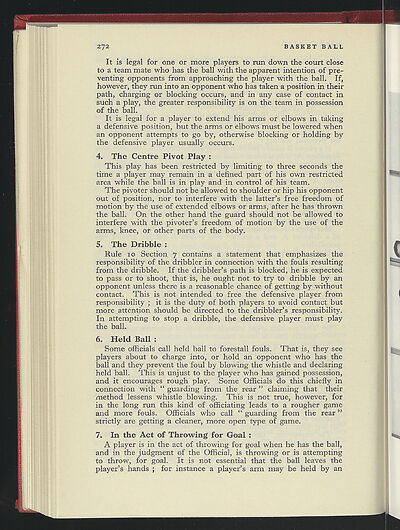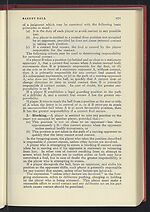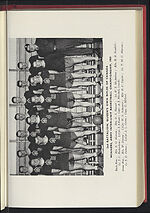1959-60
(332)
Download files
Complete book:
Individual page:
Thumbnail gallery: Grid view | List view

2'72
BASKET BALL
It is legal for one or more players to run down the court close
to a team mate who has the ball with the apparent intention of pre-
venting opponents from approaching the player with the ball. If,
however, they run into an opponent who has taken a position in their
path, charging or blocking occurs, and in any case of contact in
such a play, the greater responsibility is on the team in possession
of the ball.
It is legal for a player to extend his arms or elbows in taking
a defensive position, but the arms or elbows must be lowered when
an opponent attempts to go by, otherwise blocking or holding by
the defensive player usually occurs.
4. The
Centre Pivot
Play :
This play has been restricted by limiting to three seconds the
time a player may remain in a defined part of his own restricted
area while the ball is in play and in control of his team.
The pivoter should not be allowed to shoulder or hip his opponent
out of position, nor to interfere with the latter's free freedom of
motion by the use of extended elbows or arms, after he has thrown
the ball. On the other hand the guard should not be allowed to
interfere with the pivoter's freedom of motion by the use of the
arms, knee, or other parts of the body.
;f
5. The Dribble
:
Rule io Section
7
contains a statement that emphasizes the
responsibility of the dribbler in connection with the fouls resulting
from the dribble. If the dribbler's path is blocked, he is expected
to pass or to shoot, that is, he ought not to try to dribble
by
an
opponent unless there is a reasonable chance of getting by without
contact. This is not intended to free the defensive player from
responsibility ; it is the duty of both players to avoid contact but
more attention should be directed to the dribbler's responsibility.
In attempting to stop a dribble, the defensive player must play
the ball.
6. Held Ball
Some officials call held ball to forestall fouls. That is, they see
players about to charge into, or hold an opponent who has the
ball and they prevent the foul by blowing the whistle and declaring
held ball. This is unjust to the player who has gained possession,
and it encourages rough play. Some Officials do this chiefly in
connection with " guarding from the rear " claiming that their
method lessens whistle blowing. This is not true, however, for
in the long run this kind of officiating leads to a rougher game
and more fouls. Officials who call " guarding from the rear "
strictly are getting a cleaner, more open type of game.
7.
In the Act of Throwing
for Goal :
A player is in the act of throwing for goal when he has the ball,
and in the judgment of the Official, is throwing or is attempting
to throw, for goal. It is not essential that the ball leaves the
player's hands ; for instance a player's arm may be held by an
BASKET BALL
It is legal for one or more players to run down the court close
to a team mate who has the ball with the apparent intention of pre-
venting opponents from approaching the player with the ball. If,
however, they run into an opponent who has taken a position in their
path, charging or blocking occurs, and in any case of contact in
such a play, the greater responsibility is on the team in possession
of the ball.
It is legal for a player to extend his arms or elbows in taking
a defensive position, but the arms or elbows must be lowered when
an opponent attempts to go by, otherwise blocking or holding by
the defensive player usually occurs.
4. The
Centre Pivot
Play :
This play has been restricted by limiting to three seconds the
time a player may remain in a defined part of his own restricted
area while the ball is in play and in control of his team.
The pivoter should not be allowed to shoulder or hip his opponent
out of position, nor to interfere with the latter's free freedom of
motion by the use of extended elbows or arms, after he has thrown
the ball. On the other hand the guard should not be allowed to
interfere with the pivoter's freedom of motion by the use of the
arms, knee, or other parts of the body.
;f
5. The Dribble
:
Rule io Section
7
contains a statement that emphasizes the
responsibility of the dribbler in connection with the fouls resulting
from the dribble. If the dribbler's path is blocked, he is expected
to pass or to shoot, that is, he ought not to try to dribble
by
an
opponent unless there is a reasonable chance of getting by without
contact. This is not intended to free the defensive player from
responsibility ; it is the duty of both players to avoid contact but
more attention should be directed to the dribbler's responsibility.
In attempting to stop a dribble, the defensive player must play
the ball.
6. Held Ball
Some officials call held ball to forestall fouls. That is, they see
players about to charge into, or hold an opponent who has the
ball and they prevent the foul by blowing the whistle and declaring
held ball. This is unjust to the player who has gained possession,
and it encourages rough play. Some Officials do this chiefly in
connection with " guarding from the rear " claiming that their
method lessens whistle blowing. This is not true, however, for
in the long run this kind of officiating leads to a rougher game
and more fouls. Officials who call " guarding from the rear "
strictly are getting a cleaner, more open type of game.
7.
In the Act of Throwing
for Goal :
A player is in the act of throwing for goal when he has the ball,
and in the judgment of the Official, is throwing or is attempting
to throw, for goal. It is not essential that the ball leaves the
player's hands ; for instance a player's arm may be held by an
Set display mode to:
![]() Universal Viewer |
Universal Viewer | ![]() Mirador |
Large image | Transcription
Mirador |
Large image | Transcription
| Games and sports in the army > 1959-60 > (332) |
|---|
| Permanent URL | https://digital.nls.uk/248867354 |
|---|
| Description | 'Games and Sports in the Army' was an annual publication produced by the British War Office between the 1930s and 1960s. This included the Second World War. It outlines the rules and regulations for games and sports played by members of the armed forces. It features names and photographs of team members, and examples of contemporary advertising. |
|---|---|
| Shelfmark | GWB.52 |

